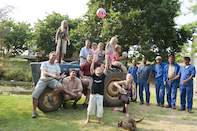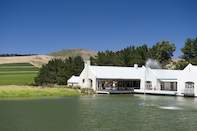This boutique family wine farm celebrates the bounty of nature like no other. Come and have fun with family and friends at Nitida which has become the heart of a vibrant rural community.
Wine Entrepreneur

Against a hillside of Durbanville Kloof, and barely visible among pines and bluegum trees, lies the gem that is Nitída. Named after Protea nitida, a plant found on the property, this wine farm is truly 'boutique'· - the smallest cellar in this valley of wine farms.
Bernhard Veller was a metallurgist in Gauteng before he moved to the Cape with his wife Peta towards the end of the 1980s. They came to Maasspruit farm in rural Durbanville, then still one of the Cape’s best-kept viticultural secrets. Fired by an entrepreneurial spirit and a great love of wine, particularly red, Bernhard was soon bitten by the winemaking bug.
When viticulturists confirmed that the farm’s deep and rich, clay-based Hutton soils had potential for vines, he started planting in 1992, gradually building up to some 15 hectares of classic varieties: sauvignon blanc, merlot and shiraz, as well as the Cape’s homegrown pinotage.
At the time, Bernhard was one of the first independent wine farmers in a valley with a history that stretched back to the early 1700s. ln the 20th century, Durbanville was an important yet little-known source of top-class fruit for some of the best-selling wine brands made by the large Cape wine wholesalers.
Only four farms - Altydgedacht, Diemersdal, Bloemendal and Meerendal - were selling their own wines when he arrived. Self-taught and unencumbered by tradition, he kept his cellar small and and his wine-making simple, focusing on modern scientific viticulture and matching specific varieties to the sites they were best suited to.
Typically of Durbanville, the hills of his farm offer various different aspects, altitudes and micro-climates to produce outstanding fruit he believed would sell his wines.
Boutique Winemaking

In addition, the southeaster, blowing in from the chilly Atlantic in summer, slows the ripening of the fruit and concentrates flavour in the berries. A fermentation cellar, with a small collection of stainless steel tanks for the 140 tons of grapes harvested each year is housed in a simple, sand-coloured building.
In a similar building next door lie rows of small French oak barrels, in which Bernhard matures his red wines. At one end of it, at two counters sculpted from massive yellowwood trunks, you can sample Nitída’s wines as you look through the big wooden cellar doors down into the valley.
Durbanville has become renowned for its Sauvignon Blanc wines and Nitída’s is one of the finest: a fresh, racy number full of tropical fruit flavours. The maiden 1995 vintage had connoisseurs sitting up and taking enough notice to award it a Veritas Double Gold.
It has since featured in a variety of bottlings, the single standard joined by a classic Bordeaux-style white blend with semillon called Coronata and maturing vines also delivering the stand-out single-vineyard Golden Orb.
Among the reds, the smooth, full-fruited Calligraphy, a red blend made in the Bordeaux style, is considered the flagship. 'We are completely in love with our beautiful, elegant, cool-climate cabernet,' says Bernhard.
And, having replanted all the farm’s virus-infected, merlot, cabernet franc and cabernet sauvignon, his aim is to make quite simply the best Bordeaux-style red blend in the country, concentrating on richness of fruit rather than over-extraction and over-wooding.
In the signature style of this entrepreneurial winemaker and canny market reader, who previously introduced a Cap Classique made from shiraz, a style pioneered in France and made popular in Australia but a rarity in South Africa, eventually went the classic route with his pure pinot noir rosé Grande Matriarch Méthode Cap Classique.
Meanwhile, lovers of Riesling will be happy to hear that he planted a small vineyard of this classic German variety that has all but disappeared from the modern Cape wine scene. The first bottlings reflected the light, floral Mosel style he favours.
The variety has also lent its susceptibility to the botrytis cinerea ‘noble rot’ fungus to the production of a sumptuous sweet dessert wine under the apt new label The Tinkery, reserved for experimental releases that take Bernhard’s and his winemaker Etienne Louw’s fancy. Look out too for the occasional Modjadji Semillon Noble Late Harvest.
After a morning or afternoon of tasting, enjoy a meal at Cassia, the contemporary fine-dining restaurant at the entrance to the farm that offers eclectic food and sublime views from the sundeck, or the more informal, family-friendly Tables at Nitida.
 The winelands of Constantia and Durbanville share more than just their conveniently close proximity to Cape Town. Their elegant, fruit-rich ...
The winelands of Constantia and Durbanville share more than just their conveniently close proximity to Cape Town. Their elegant, fruit-rich ...